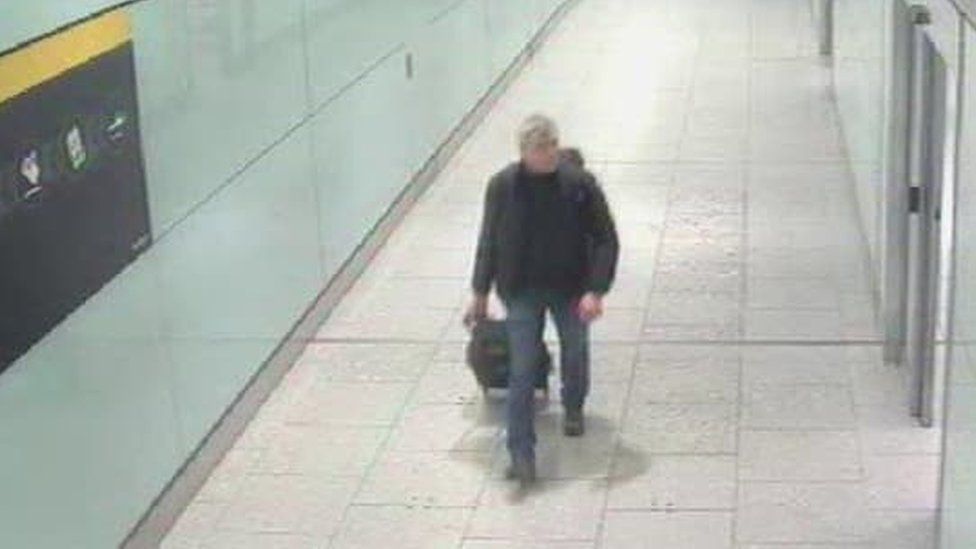Salisbury poisonings: Third man faces charges for Novichok attack

A third Russian faces charges over his alleged involvement in the 2018 Salisbury poisonings, which left three people critically ill and one dead.
Security sources believe Denis Sergeev was the on-the-ground commander in the Novichok attack on former double agent Sergei Skripal and his daughter Yulia.
Dawn Sturgess died after the poisoning and a police officer was badly injured.
Police also confirmed they believe the suspects in the case belonged to a Russian military intelligence team.
Sergeev is believed to have been the senior member of the team from Russia’s GRU and has also been linked to other covert activity across Europe.
The Crown Prosecution Service has now authorised charges, but the suspects cannot be formally charged unless they are arrested.
All three suspects are thought to be in Russia.
Nick Price, head of the special crime and counter terrorism division at the CPS, said there was “sufficient evidence to provide a realistic prospect of conviction” and that it was in the public interest to charge Sergeev.
Prosecutors were working with police to bring the attackers to justice “where possible” but Russia has made clear it does not extradite its citizens, he said.
Downing Street said that if the suspects left Russia the government would do “everything we can to extradite them and bring them to justice in the UK”.
A spokesman said the government had maintained throughout that this was “not a rogue operation and only the Russian state had the technical means and experience and the motive to carry out this attack”.
The Foreign Office would raise the case with the Russian ambassador, the spokesman added.
On 2 March 2018, the alleged GRU hit team came to the UK.
Two men, using the names Alexander Petrov and Ruslan Boshirov, arrived in the afternoon at Gatwick airport. Police have now for the first time confirmed their real names as Anatoliy Chepiga and Alexander Mishkin.
The third man, Denis Sergeev, using the name Sergey Fedotov, had arrived at Heathrow airport earlier that day at 11:00 GMT.
 IMAGE SOURCE, METROPOLITAN POLICE
IMAGE SOURCE, METROPOLITAN POLICEChepiga and Mishkin travelled to Salisbury on Sunday 4 March, allegedly to smear the military-grade nerve agent Novichok on the handle of former GRU officer Sergei Skripal’s front door.
He and his daughter fell seriously ill as did Nick Bailey, then a police officer.
Sergeev remained in London the whole time before leaving on a flight to Moscow at 13:45, having made a late change to his plans. The other two left on a later fight at 22:30.
Police say they now have evidence the men were operating as a team and that all three met on a number of occasions in London over that weekend.
On some occasions, this was indoors, on others it was in the open air – although the police will not specify exactly where.
The role and identity of Sergeev had been previously disclosed by the investigative site Bellingcat in February 2019 and some of his movements and phone contacts were detailed in a joint investigation with the BBC, including his proximity to Paddington, Oxford Circus and Embankment.
But the police have been working on building up evidence of his role, a process described as “challenging” but which has eventually led to today’s announcement.
“We remain as determined as ever to bring those responsible to justice,” said Dean Haydon, assistant commissioner at the Metropolitan Police and senior national coordinator for counter-terrorism policing.
The charges authorised against the three men are conspiracy to murder, attempted murder, causing grievous bodily harm and use and possession of a chemical weapon.
Chepiga and Mishkin appeared on Russian TV after being identified in 2018 and said they had been to the city simply as tourists to see the cathedral. Russia has always denied any involvement.
Traces of Novichok were found in Chepiga and Mishkin’s hotel room, although none were found in that used by Sergeev.
The Novichok in the perfume bottle could potentially have killed thousands of people, police say.
But there remain significant gaps in the investigation, including how the Novichok came into the UK and where it was between its use in March and its discovery in June in Amesbury in a discarded perfume bottle.
Dawn Sturgess died days after spraying some of the bottle’s contents on herself.
Pre-inquest hearings into her death, presided over by former High Court judge Baroness Hallett, are due to resume this week.
Source: (BBC News)

